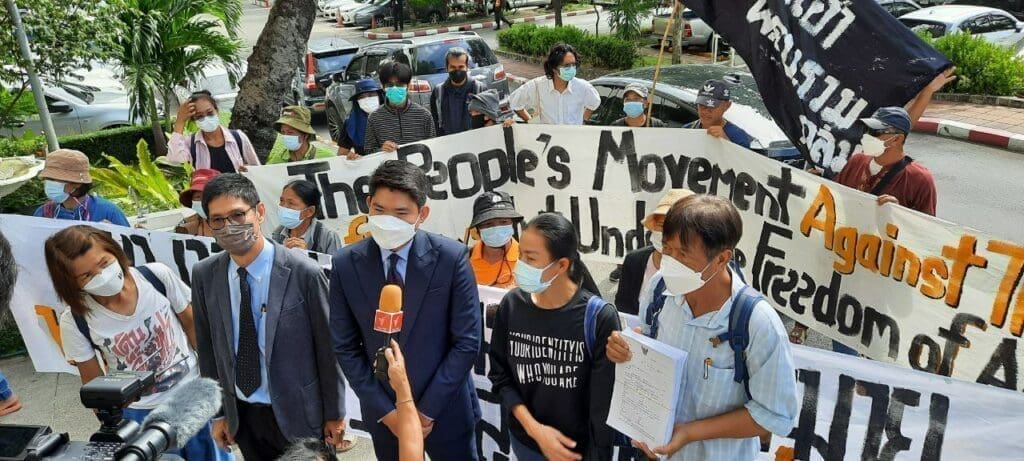On the morning of 26 May 2022, a group of Thai human rights defenders held a demonstration in front of the Government House of Thailand in Bangkok in protest against the proposals of additional laws to curb freedom of association and the right to peaceful assembly. They called upon authorities to stop wrongfully using COVID-19 laws to restrict the agency of human rights defenders across the country.
The group had already previously held a protest on 24 May 2022 to denounce the State’s effective use of the COVID-19 pandemic as a pretext to use repressive tactics to hinder the defenders’ right to protest. Authorities blocked road access to prevent the defenders from traveling to the protest. The defenders exercised their right to assembly and gathered during the march of the Economic and Social Commission for Asia and the Pacific (ESCAP) in front of the Government House, where barbed wire and barriers had been installed to block the public from passing. The authorities placed large objects including shipping containers, cars, buses and train cars, fuel containers, barbed wire, and other equipment to block public pathways in an attempt to prevent protesters from manifesting in large numbers. Blocking road access violates Thailand’s Constitution, restricting defenders rights in their everyday work.
It all originated with the enactment of the Emergency Decree on Public Administration in Emergency Situation on 2 March 2020 to control the spread of the pandemic in granting state authorities the right to impose curfews and other limiting measures. Even though Thailand has now successfully controlled the spread of the virus, these laws have repeatedly been extended without justification, they are still used to control the general population, and they limit the agency of human rights defenders.
Representatives of the People’s Movement Against the Draft Laws that Undermine Freedom of Association, Mr. Tienudom, Mr. Wichan, and Mr. Sahyomhai filed a civil case that same day against the Prime Minister’s Office, the Royal Thai Armed Forces, the Ministry of Finance, the Royal Thai Police and two army generals (Mr. Prayut Chan-ocha and Mr Chalermpol Srisawasdi). The group denounces the arbitrary exercise of administrative power and breaches of international standards. The proposed regulations violate, restrict, and infringe rights and freedoms that are protected under the Constitution of Thailand, and they hope to deem them inviable for approval. We note that the law proposals were also issued without any checks and balances on the exercise of power.
The plaintiffs are demanding that the Thai Prime Minister’s Cabinet rescind the late approval of the draft Act on the Operations of Not-for-Profit Organizations (otherwise known as the NPO law). This law would hinder the right to dignity, the right to freedom of expression, freedom of association, freedom of movement, and freedom of peaceful and unarmed assembly of Thai protesters. They are asking authorities to stop using their powers to violate human rights as well as urging them to guarantee HRDs’ public safety and basic freedoms. Finally, they are asking for financial reparations of up to 1.8 million baht (around 49000€) for damages related to the violation of their rights.
They have asked the court to repeal the special regulations issued through section 9 of the Emergency Decree (B.E. 2548 (2005) no. 15, Article 3 and no. 37, Article 2) and more particularly the Announcement no. 14 of the Emergency Decree which bans public gathering or any activity or illegal assembly which may likely lead to the spread of Covid-19. The provisions prohibit carrying out an assembly or a protest, even though the right to protest in a defined zone is guaranteed by the Constitution. Now the control zone and maximum number of participants are being limited to a very small number.
The group states that such regulations aim to restrict the rights and freedoms of the general public rather than to address the spread of the virus. Additionally, the defenders state that those legislations are not an adequate response to the sanitary situation in Thailand. Largely, the current Covid-19 pandemic has been successfully put under control and political measures have been relaxed, to the point that authorities are considering declassifying its status as a “pandemic”.
In an internationally recognized democratic system, the passing of new regulations must be in compliance with the rule of law, good governance, and international human rights obligations as stated in the Universal Declaration of Human Rights (UDHR) and the International Covenant on Civil and Political Rights (ICCPR) to which Thailand is a state party. The State needs to abide by those standards to ensure the protection of fundamental freedoms for human rights defenders and the general public.
Pending the final verdict of the case, the People’s Movement Against the Draft Laws that Undermine Freedom of Association took to the streets again on 30 May 2022 demanding the government and the court to prohibit the use of Covid-19 regulations as a pretext to stop lawful public assembly and demand the immediate stop of using barbed wire and shipping containers as a strategy to demean protesters’ rights.


